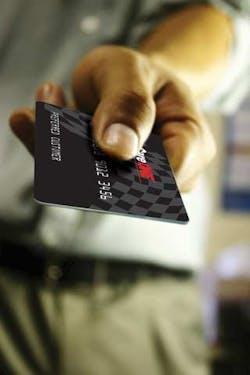How to use credit to secure repeat business
There are many tools at the independent tire dealer’s disposal that can be used to secure repeat business. Some dealers put customers on strict preventive maintenance plans. Some promote tire rotations, oil changes, brake checks and other interval-based services. Others bring customers back with specials and coupons.
Extending credit in the form of a dedicated, private label credit card can be another effective way to bring customers back to your store, says John Howard, industry marketing manager for GE Money, a third-party credit vendor that counts thousands of independent tire dealers among its clients.
“It’s important for retailers to realize that customers who use a specific private label credit card spend more and make more frequent visits to their locations.
“Once a retailer understands that and goes out and puts the customer on a credit program, they can establish a relationship with that customer.”
Howard says there are several ways to promote credit at your dealership:
1. “Communicate the value of giving the customer a longer length of time to pay for the product.” Starting Feb. 22, credit card promotions with durations of less than six months will not be allowed, thanks to the Credit CARD (Card, Accountability, Responsibility and Disclosure) Act of 2009, which was passed last May.
That means the traditional “90-days-same-as-cash” deal will cease to exist.
“You’re giving the customer six months to pay for it instead of the customer laying out a large amount of money. Obviously, the customer would be required to make minimum monthly payments, but the value is that he or she is not parting with a lot of cash.”
2. Dovetail the use of credit into a vehicle maintenance program. “When you’re communicating to the customer the services they need to have done to their car, that’s the perfect time to communicate the (payment) options they have,” says Howard.
3. Put up signage — and lots of it. “It’s important to display signage regarding credit and promotions throughout your store... making sure customers know that special financing is available.”
[PAGEBREAK]“Once you have customers on the program, you can leverage that list to send them direct mail pieces to remind them of an oil change or some other service they may need.”
Once a customer opens a line of credit at a tire dealership, the initial purchase is usually bigger than follow-up purchases, according to GE Money research.
“However, subsequent purchases on a private label card are always higher than purchases on a bank credit card. Consumers like to reserve bank cards for emergencies and things of that nature, whereas a private label card is just for that store, so they have a dedicated line of credit.”
One dealer’s strategy
Craig Bruneel, president of Boise, Idaho-based Bruneel Tire Factory, which has 11 stores, is a big proponent of offering credit.
“I tell my guys, ‘If you can get a customer to open an account with our company, that customer will be back within 90 days.’”
Bruneel pays his salespeople spiffs to convince customers to apply for credit, “even if the application gets declined.”
He also incentivizes customers to apply for credit. “For example, if they use the account anytime they come in, we’ll give them an oil change at our lowest advertised price. They don’t have to watch coupons, they don’t have to look around for another deal.
“At times, if we’re really pushing credit, we’ll even throw in a free oil change.”
Bruneel says there are three types of credit buyers — “people who use credit for convenience, people who use it like a revolving credit card, and people who trade balances from card to card to save 2%.” He’ll do business with all three.
“It’s a competitive world out there. If the customer says, ‘Yeah, I have one of your cards,’ you can sell the better tire and the higher margin tire. Your ticket will be bigger.” ■
[PAGEBREAK]
Major changes looming -- Make sure you’re up to speed on Credit CARD Act
The Credit CARD (Card, Accountability, Responsibility and Disclosure) Act will alter many aspects about how credit is offered to consumers when it goes into effect this month. Among other things, the law will demand:
• Clear disclosure of annual percentage rates.
• Disclosure of additional promotional information (in writing) specific to each customer prior to that person making a promotional purchase.
• Customers younger than 21 must apply using a channel that captures their signature on the terms of the account.
• New, additional headline disclosure content must be in immediate proximity to the first reference of promotions in printed and electronic advertising materials, excluding radio and TV.
All shop signage must also be in compliance. For example, after Feb. 22, you cannot advertise obsolete terms like “90-days-same-as-cash.” For more information, including answers to frequently asked questions, see www.gemoney.com/en/business/2010FAQ2.html.
